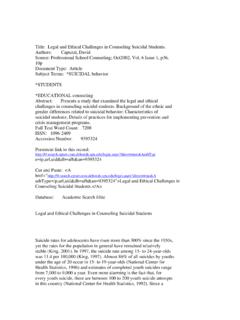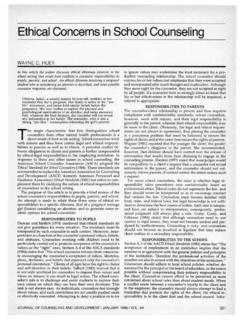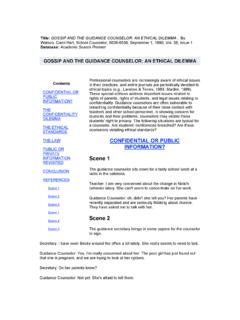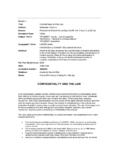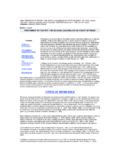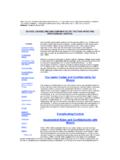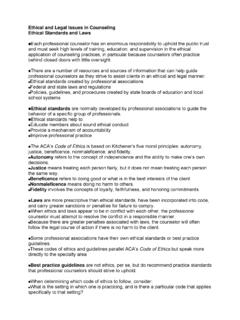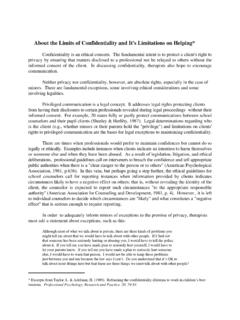Transcription of CONFIDENTIALITY RIGHTS OF MINORS Minors' …
1 Title: When Parents Want to Know: Responding to Parental Demands for Confidential Information , By: Mitchell, Clifton W., Disque, J. Graham, Robertson, Patricia, Professional School counseling , 1096-2409, December 1, 2002, Vol. 6, issue 2 Database: Academic Search Elite When Parents Want to Know: Responding to Parental Demands for Confidential Information Research indicates that counselors struggle when faced with issues surrounding CONFIDENTIALITY RIGHTS of MINORS and RIGHTS of parents. Davis and Mickelson (1994) reported that, in responses to vignettes of legal and ethical dilemmas, school counselors were most confused when dealing with legal issues surrounding parents' RIGHTS and students' RIGHTS . Similar research by Isaacs and Stone (1999) indicated that there is still considerable variance in school counselors' perceptions of when CONFIDENTIALITY should be breached, particularly in situations where no clear legal or ethical precedent has been established.
2 Such situations can be quite vexing, especially when they carry the potential for significant consequences for students. Although issues surrounding the CONFIDENTIALITY RIGHTS of MINORS have been discussed extensively (Gustafson & McNamara, 1987; Isaacs & Stone, 1999; Kaczmarek, 2000; Ledyard, 1998; Myers, 1982; Sealander, Schwiebert, Oren, & Weekley, 1999; Welfel, 2002), specific guidance for responding to parental demands for confidential information is limited. Difficulties in balancing parental and student RIGHTS arise because the CONFIDENTIALITY RIGHTS of minor children are not always clearly delineated by law, ethical codes, or social standards (Isaacs Ledyard). This lack of clarity may result in school counselors feeling as if they are walking a tightrope between being a professional helper and being an informant to parents.
3 When faced with CONFIDENTIALITY dilemmas that involve minor children, school counselors must take into consideration a number of factors. Central to CONFIDENTIALITY decisions is consideration of the legal and ethical guidelines related to parents' and MINORS ' RIGHTS , competency or developmental age of the child, and the best interest of the child (Gustafson & McNamara; Isaacs & Stone). This article focuses on issues surrounding parental RIGHTS and the CONFIDENTIALITY RIGHTS of MINORS . Primary legal and ethical considerations with respect to CONFIDENTIALITY of MINORS are reviewed, arguments central to CONFIDENTIALITY issues are presented, and alternatives available to school counselors when parents demand to know what a child has revealed in a counseling session are provided. CONFIDENTIALITY RIGHTS OF MINORS As is commonly understood, the ethical codes and the law are in agreement that CONFIDENTIALITY is to be broken in cases where child abuse is suspected, in cases of harm to self such as attempted suicide, and in cases where clear and imminent danger to others is threatened.
4 Beyond these three primary instances where CONFIDENTIALITY must be broken, there is ambiguity relative to who has the right to information provided by MINORS in counseling sessions. Conflicts arise with regards to information shared in counseling sessions because, historically, parents or legal guardians control the legal RIGHTS of their children, while the ethical codes extend CONFIDENTIALITY to all clients (Lawrence & Kurpius, 2000). However, neither the law nor the ethical codes provide specific and consistent guidance as to what school counselors should do in all situations where considerations of breaches of CONFIDENTIALITY are relevant. This lack of clarity is further complicated for school counselors because open communication norms are common within school settings among educators, and this practice conflicts with the CONFIDENTIALITY norms of counselors (Welfel, 2002).
5 A brief review of the legal considerations is addressed first, followed by a discussion of the ethical considerations. MINORS ' CONFIDENTIALITY RIGHTS and the Law In most areas, the law has not extended CONFIDENTIALITY RIGHTS to children. This position is based on historical precedent and issues of competency. Historically, children have moved from a position where parents have "absolute power" over their lives to the degree that they could be sold into slavery, to their current status where a host of laws have been enacted to protect their RIGHTS and well-being (Lawrence & Kurpius, 2000. Recent federal Contents CONFIDENTIALITY RIGHTS OF MINORS MINORS ' CONFIDENTIALITY RIGHTS and the Law MINORS ' CONFIDENTIALITY RIGHTS and Ethics Issues Professional Considerations OPTIONS FOR RESPONDING TO PARENTAL DEMANDS FOR CONFIDENTIAL INFORMATION SUMMARY References law protects the CONFIDENTIALITY , of MINORS in receiving alcohol and drug treatment (Sealander et al.))
6 , 1999). In addition, some states have enacted legislation that extends CONFIDENTIALITY for MINORS in situations involving birth control, pregnancy, abortion, and testing for sexually transmitted diseases (Corey, Corey, & Callanan, 1998; Welfel, 2002) as well as the right to confidential HIV testing (North, 1990). With the exception of the special circumstances mentioned above, parents control the legal affairs of their minor children (Lawrence & Kurpius, 2000; Welfel, 2002). However, opinions vary considerably regarding MINORS ' CONFIDENTIALITY RIGHTS in counseling . Remley (1993) stated that, "Parents or guardians probably have the legal right to know the content of counseling sessions with MINORS ". Unless state or federal law indicates an exception, others have expressed general agreement with this legal perspective (Lawrence Welfel).
7 Yet, in contrast to the extensive legal privileges of parents noted, Corey et al. (1998) stated that, "If parents or guardians of MINORS request information about the progress of the counseling , the therapist is expected to provide some feedback". This implies that specific information does not necessarily have to be revealed, yet some general feedback may be expected. As comprehensive as the law may appear, noted discretion can and should be used when inquisitive parents seek information disclosed in counseling sessions. In contrast to Remley (1993), Myers (1982) asserted that, "The fact of minority in no fashion lessens the importance of the sanctity of confidential communications". Myers then suggested that the duty to CONFIDENTIALITY may actually be "enhanced" for those dealing with MINORS , noting that "the therapist's duty of CONFIDENTIALITY runs to the client, not the parents".
8 Welfel (2002) indicated that such positions validating MINORS ' RIGHTS have increased since a 1967 Supreme Court ruling that concluded that equal protection under the law granted by the Fourteenth Amendment and the Bill of RIGHTS , as a whole, was not solely for adults. Fischer and Sorenson (1996) noted that "state laws typically do not address questions related to counselors' keeping information from parents" (p. 25), and that counselors should use their professional judgment regarding when, how much, and what information should be shared with parents. However, it should be noted that the each state's laws are unique (Myers), and it is the school counselor's duty to learn if the laws of the state in which they practice have addressed this issue as well as what that law asserts. MINORS ' CONFIDENTIALITY RIGHTS and Ethics Issues The considerable control that the law affords parents over the legal RIGHTS of their children may conflict with the standards of practice provided by the ethical codes.
9 To further compound this dilemma, the ethical codes offer little specificity regarding the discretion extended counselors with respect to CONFIDENTIALITY and MINORS . The American counseling Association (ACA, 1995) Code of Ethics and Standards of Practice includes the statement, "When counseling clients who are MINORS or individuals who are unable to give voluntary informed consent, parents or guardians may be included in the counseling process as appropriate. Counselors act in the best interest of clients and take measures to safeguard CONFIDENTIALITY " ( ). Details on what constitutes "as appropriate" while "safeguarding CONFIDENTIALITY " are left open, as is a clear explanation of what constitutes "the best interest of the client." In its Ethical Standards for School Counselors, the American School Counselor Association (1998) has gone to considerable lengths in attempting to consider the RIGHTS and needs of parents, administrators, and teachers regarding information revealed by MINORS in counseling .
10 The writers of the standards are to be commended. The fact that the results of these efforts leave school counselors with a document that includes mixed messages reflects the dilemma that is genuinely present. The Ethical Standards for School Counselors include the statement that the school counselor, "Protects the CONFIDENTIALITY of information received in the counseling relationship as specified by federal and state laws, written policies, and applicable ethical standards. Such information is to be revealed to others with the informed consent of the counselee, consistent with the counselor's ethical obligation" (ASCA, ). Yet, these same codes include the statements that the school counselor, "Respects the inherent RIGHTS and responsibilities of parents" (ASCA, ) and "Makes reasonable efforts to honor the wishes of parents.

